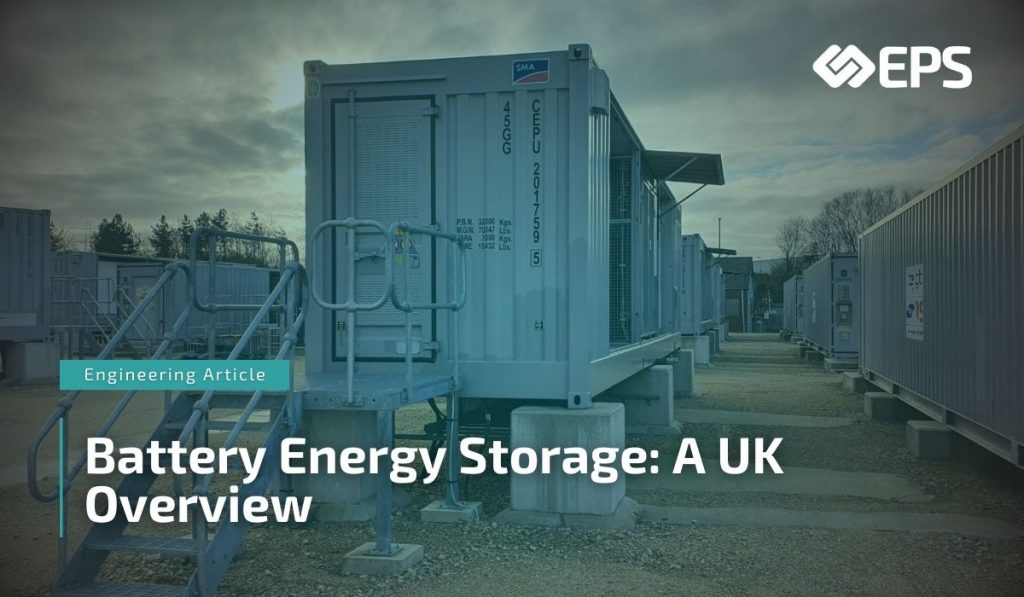Battery energy storage is becoming essential to the UK’s transition to a low-carbon energy future. By storing surplus electricity from renewable sources like wind and solar PV farms, BESS enables the storage of surplus energy to be used when needed most (not just when it’s produced). These systems also play a key role in stabilising the grid and improving the overall reliability of the power supply.
In this article, we explore how the UK’s BESS market is evolving, covering policy changes, deployment trends and future projections. We also highlight the vital role of engineering consultancy in delivering safe, scalable and efficient battery storage solutions.
(2025 Update) Where the BESS Market Stands in 2025

Battery energy storage systems (BESS) are attracting strong interest from investors. These systems offer multiple revenue opportunities, including grid services, energy trading and participation in demand response programmes. Government support is also helping to drive growth, with incentives available in several countries, including the United Kingdom.
Growth of the Battery Energy Storage Industry
In the UK, the number of grid-scale battery installations has risen significantly. This growth has been supported by relaxed planning regulations introduced in July 2020, a policy change supporting the national target of achieving 40GW of installed battery storage capacity by 2030.
Momentum picked up in 2022, with the UK adding a record 800 MWh of new utility-scale energy storage. This was the highest annual deployment on record, and in the same year, the national energy storage pipeline jumped by 34.5 GW.
To put the pace into perspective: in 2017, the UK had just one 50 MW battery project. By 2021 and 2022, that number had risen to nine projects per year. Average project sizes followed suit, growing from 4.4 MWh in 2017 to 36 MWh in 2022. This was thanks in part to longer battery durations and energy storage strategies.
Future of BESS in the UK
Rising Operational Capacity Across the UK
Grid-scale battery installations are on the rise across the UK. Today, there are 2.4 GW / 2.6 GWh of operational energy storage spread across 161 sites. These systems are key to strengthening grid stability and enabling more flexible energy use.
Construction Pipeline Accelerates Growth
More capacity is on the way. Around 2.6 GW / 4.3 GWh of new storage is currently under construction and expected to go live within the next 18 months. This wave of development reflects growing confidence in both the market and the technology.
Record-Breaking Development Plans
In 2022, the UK recorded 20.7 GW of planned storage capacity across 295 sites (the highest annual figure to date). This includes several large-scale developments ranging from 500 MW to 1 GW. Most of these projects are expected to use batteries with a minimum two-hour duration, compared to shorter durations seen in earlier years.
Larger Projects Set the New Standard
Project scale is increasing significantly. In 2017, only one 50 MW system was installed. By 2021 and 2022, that figure had jumped to nine 50 MW projects per year. The average project size also grew from 4.4 MWh in 2017 to 36 MWh in 2022, driven by advances in battery technology and system duration.
The majority of projects brought online in 2022 were submitted for planning between 2017 and 2019. There is still a substantial amount of pipeline submitted during this time period that is awaiting construction, which indicates that installed energy storage capacity will continue to increase in the near future.
(Update): Where the BESS Market Stands in 2025
The UK’s battery energy storage market shows no sign of slowing down. As of 2025, the total BESS project pipeline has surged to 127 GW, spanning operational assets, consented schemes, projects under construction, and those progressing through planning. This growth is underpinned by the ongoing integration of renewable energy sources and a pressing need to enhance grid flexibility.
Projections indicate that by 2040, demand for battery storage could exceed 200 GWh. This scale of growth underscores the vital role of partnering with a specialist electrical engineering consultancy — one that understands the complexity of integrating large-scale BESS into existing energy infrastructure.
At EPS, we provide tailored consultancy and design services to support the full lifecycle of battery storage projects. From feasibility studies and front-end design to regulatory compliance and system optimisation, our team ensures your project is engineered for performance, reliability, and long-term value, all while contributing to the UK’s broader decarbonisation goals.
Learn more about our capabilities here.










